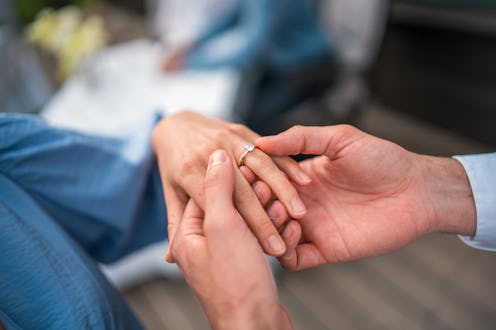Life
Here's Why The Term "Fiancé" Should Be Retired

When it comes to American marriage traditions, there are some that are adorable — I'd be lying if I said a couple's first dance isn't cute AF — and others that leave me scratching my head and wondering why on earth some people actually still do these things. The perfect example of that? Using the terms fiancé and fiancée in 2015.
I totally understand the just-got-engaged thrill, and the desire to proclaim to the world that your significant other is now going to be your spouse. But if you're a non-French speaker, it just seems a little silly to use French words to describe your relationship status. Aside from that, there's also the simple fact that it's just kind of odd to have a specific label for this in-between stage of your relationship. Call me a minimalist, but I think calling someone your "partner" is a much simpler, more progressive way to get the point across. If the two of you happen to be getting married soon, then so be it. The engagement ring will speak for itself, without you pointedly introducing your significant as "my fiancé."
Although it's hard to simply eliminate a word from the popular lexicon, I still think a case can be made for why these two particular words are better off going extinct. Here are five reasons we should retire fiancé and fiancée for good — you can use this as an excuse to come up with a unique, specific-to-you term for your bride- or groom-to-be.
1. It's Outdated
The term fiancé has been around since the mid-19th century, and, in case you weren't aware, it's almost 2016. Sure, old habits die hard, but it just seems strange to me that this is a term that's still popular. Not that I think we should all start calling each other "lawfully wedded bae" or anything like that, but I think there is a healthy compromise we can come to between old and new.
2. It's Gendered
Wait, is the one with the extra 'e' the man or the woman? Who cares, because it's unnecessary and confusing. While I understand that many nouns in Romance languages are gendered, when it comes to something as serious as your life partner, I think it would just be easier if both people called each other the same exact word, with no spelling differences. It's a small way to acknowledge that each partner is equal to the other, because after all, the two of you are a team, and being on a level-playing field (even metaphorically) is important.
3. There Are Better Options
Almost-wife? Not-a-boyfriend-not-yet-a-husband? Life partners? My person? There are infinite options for cuter, more couple-specific ways to refer to someone you'll be married to. I think calling someone your fiancé is oddly formal, like all of a sudden they're this collectible item you've acquired, instead of your support system, best friend, and lover that you want to spend the rest of your life with.
4. It's Hard To Spell, Honestly
I've been on earth for 22 years and consider myself an expert speller, and I still have to double-check where the accent goes in "fiancée." Not to be dramatic, but I'm pretty tired of this, so I'm going to go ahead and say we should toss the terms and find something easier to remember.
5. It's Showboat-y
Nine times out of 10, someone introducing their significant other as their "fiancé" does so in a look-at-me-I'm-so-happy voice, which is more than a little irritating. It not only invites but practically begs people to ask you all about the engagement and upcoming wedding. It's saying, "yeah, you might have a boyfriend, but I have a fiancé," like it's some sort of special achievement that makes their relationship more valid than yours. (And not to be a Debbie Downer, but broken engagements happen all the time, people.)
Want more of Bustle's Sex and Relationships coverage? Check out our new podcast, I Want It That Way, which delves into the difficult and downright dirty parts of a relationship, and find more on our Soundcloud page.
Images: AzmanL/E+/Getty Images; Giphy (5)